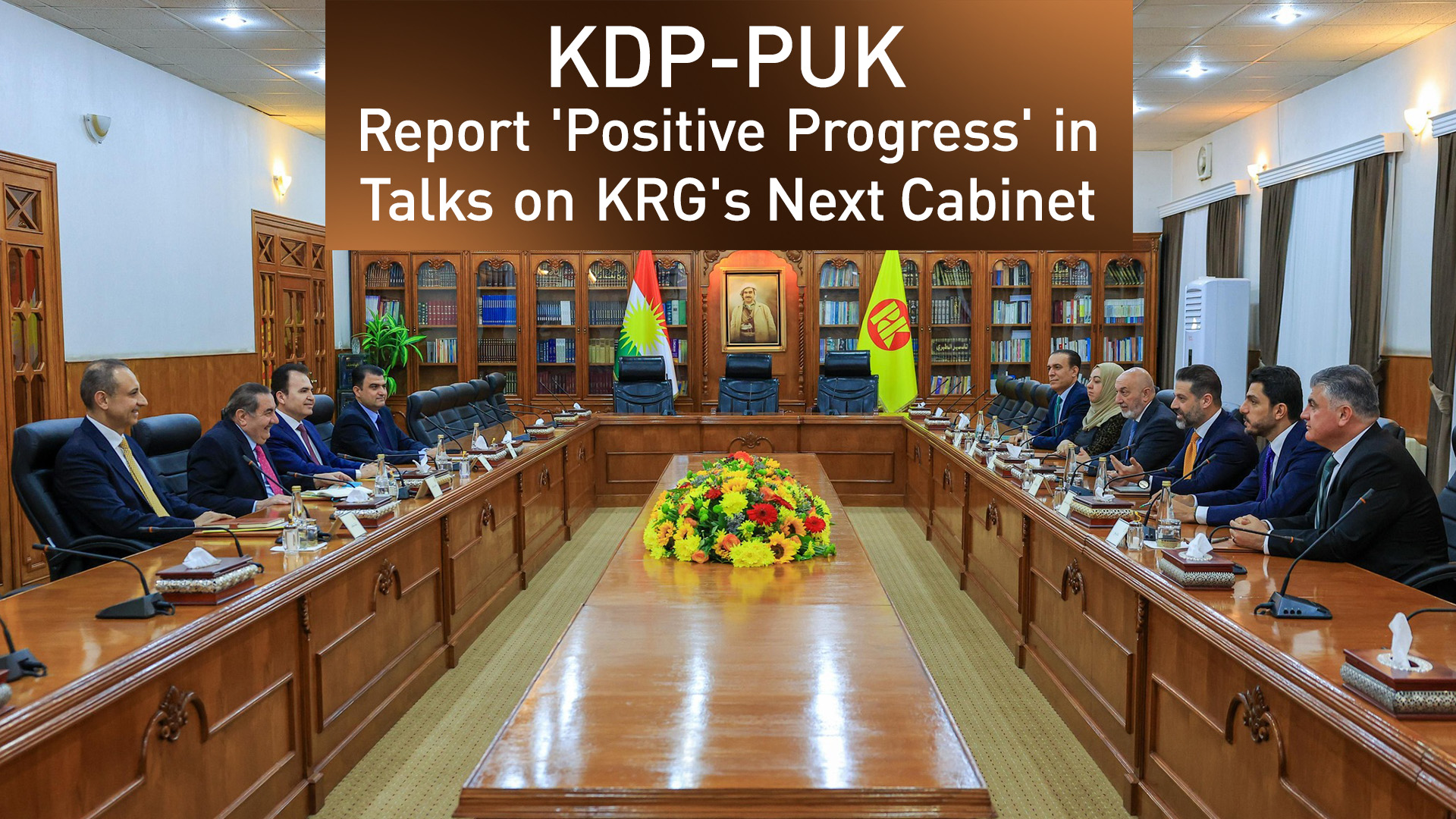KDP-PUK Report 'Positive Progress' in Talks on KRG's Next Cabinet
In their joint communiqué, the parties emphasized that discussions were held “in a friendly and positive atmosphere” and noted that further meetings are scheduled to continue “in the coming days.”

By Kamaran Aziz
ERBIL (Kurdistan24) — In a long-awaited breakthrough for the political process in the Kurdistan Region, the Kurdistan Democratic Party (KDP) and the Patriotic Union of Kurdistan (PUK) announced on Tuesday that talks to form the new cabinet of the Kurdistan Regional Government (KRG) have yielded “positive steps and good progress.” The statement, released jointly by both parties, follows a high-level meeting held at the KDP Political Bureau headquarters in Pirmam.
The negotiations marked the most significant interaction between the two dominant Kurdish political parties since the October 2024 parliamentary elections.
In their joint communiqué, the parties emphasized that discussions were held “in a friendly and positive atmosphere” and noted that further meetings are scheduled to continue “in the coming days.”
According to a senior PUK official who spoke to Kurdistan24 ahead of the meeting, the two delegations were expected to hold decisive talks specifically focused on the distribution of ministerial posts in the upcoming tenth KRG cabinet.
The official confirmed that the political framework agreement for a unified governance model had already been finalized and would guide the allocation of government roles. “Previous meetings between both delegations were dedicated to drafting the terms of the agreement. Discussions on post-distribution did not occur until now,” the official explained.
Kurdistan24 correspondent Nawras Abdullah reported that the positions under negotiation are divided into three tiers: top-level presidencies, key sovereign ministries, and service ministries. The aim is to balance influence between the two parties while ensuring administrative effectiveness. On Saturday, April 12, senior PUK figure Derbaz Kosrat Rasul confirmed that the foundational political document had been finalized and that ministerial appointments would be the main focus of the next round of talks.
“We want a unified Kurdish voice in the upcoming Iraqi parliamentary elections. Division only weakens us; unity leads to greater gains,” Rasul told Kurdistan24, stressing the broader strategic value of Kurdish political cohesion.
The urgency of these negotiations has been underscored by recent developments in federal politics. Iraqi Prime Minister Mohammed Shia’ al-Sudani has officially announced his candidacy for a second term in the upcoming national elections set for November 11, 2025. He is expected to visit Sulaimaniyah this week—a move seen as part of an outreach effort to Kurdish political blocs.
Dilshad Shahab, spokesperson for the Kurdistan Region Presidency, further confirmed on Monday that the parties are “very close to reaching an agreement.” Shahab highlighted that a comprehensive roadmap is being drafted for the upcoming cabinet that would reflect the electorate’s will. “The government must be built upon the people’s vote, and that vote must be honored,” he said.
According to the official results of the sixth term elections for the Kurdistan Parliament, the KDP secured 39 seats, while the PUK won 23. These results reflect a slight reshuffling of parliamentary dynamics since the fifth term, during which the KDP held 45 seats and the PUK 21. In the previous cabinet—the ninth—the KDP held the premiership and nine ministries, while the PUK controlled five ministries and the deputy premiership. The Gorran Movement held four ministries.
The composition of the delegations in the latest Pirmam meeting signals the high political stakes. The KDP delegation included Hoshyar Zebari, Pshtiwan Sadiq, Dilshad Shahab, and Omed Sabah. The PUK delegation was led by Qubad Talabani and included Amanj Rahim, Derbaz Kosrat Rasul, Nizar Amedi, Rewaz Fayeq, and Shalaw Salah Sheikh Sharaf—figures central to shaping the party’s governance strategy.
The talks also come at a time of mounting internal and external challenges for the Kurdistan Region, including unresolved disputes with Baghdad over oil exports, budget allocations, and territorial control. Historically, KDP-PUK cooperation has been marked by both strategic alignment and deep political rifts. The current drive toward unity is widely viewed as critical for preserving regional stability and maximizing Kurdish leverage at the federal level, particularly ahead of Iraq’s next electoral cycle.
While details of the final cabinet structure remain undisclosed, both parties have expressed optimism that a new government could be announced soon. Political observers believe that resolving cabinet formation would restore institutional clarity and public confidence.